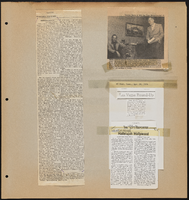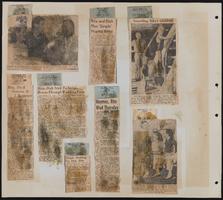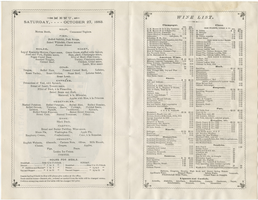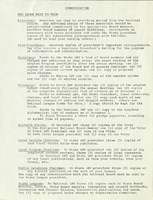Search the Special Collections and Archives Portal
Search Results
Joan Olson Griffith oral history interview
Identifier
Abstract
Oral history interview with Joan Olson Griffith conducted by Sharee Schrader on April 12, 2005 for the History of Blue Diamond Village in Nevada Oral History Project. Griffith begins by discussing why she moved to Blue Diamond, Nevada with her family due to job opportunities at the Blue Diamond Plant, where they manufactured wallboard, in 1956. She describes life in Blue Diamond and rural Nevada, the education available in the village, and Blue Diamond's proximity to Bonnie Springs Ranch and structures made for the filming of Western themed media. Griffith concludes by discussing how Blue Diamond has changed since the 1950s and being a Sunday school teacher for eighteen years.
Archival Collection
Bob Fisher oral history interview
Identifier
Abstract
Oral history interview with Robert Fisher conducted by Barbara Tabach on January 08, 2015 for the Southern Nevada Jewish Heritage Project. In this interview, Fisher discusses his childhood in Minnesota, and the large role Judaism played in his upbringing. He speaks at length about his involvement with United Synagogue of Conservative Judaism over the years, including as regional director of the United Synagogue Youth Far West Region, which took him from Minnesota to California. He talks about his time in Los Angeles, California, and later, about his life in Las Vegas, Nevada, including his broadcasting career as well as involvement with Midbar Kodesh Temple.
Archival Collection
Tonopah and Tidewater Railroad Records
Identifier
Abstract
The Tonopah and Tidewater Railroad Records (1905-1977) contain correspondence, purchase requisitions, bills of lading, freight reports, and waybills. Also included are a ledger book, a rubber stamp, and a booklet, "Diagrams of Locomotives and Tenders." Incorporated in 1904, the Tonopah and Tidewater Railroad operated for 35 years, connecting Ludlow, California with Beatty, Nevada by way of Death Valley on the Santa Fe Railroad main line. The records are concentrated on the later years of the railroad from 1930 to 1940.
Archival Collection
Russ Morgan Music Manuscripts
Identifier
Abstract
The Russ Morgan Music Manuscripts (approximately 1950-1967) are comprised of manuscript arrangements used by the Russ Morgan Band for live concert, radio, and television performances. The collection includes handwritten scores and parts for popular music.
Archival Collection

Transcript of interview with Florence McClure by Joanne Goodwin, January 24, 1996 & February 6, 1996
Date
Archival Collection
Description
Florence McClure came to Las Vegas later in her life, but the state felt her presence and the community her contributions as if she were a native daughter. Introduced to the League of Women Voters in 1967, McClure met her political mentor Jean Ford and learned how to practice the core elements of democracy. She put those tools to work in a number of ways, however her participation in the creation of the Rape Crises Center and her advocacy for locating the women’s prison near Las Vegas are two of her long-lasting efforts. Florence Alberta Schilling was born in southern Illinois where she enjoyed the security of a tight-knit family and the independence to test her abilities growing up. She graduated from high school and attended the MacMurray College for Women at Jacksonville. With the attack on Pearl Harbor in 1941, she began a series of jobs working for the war effort. She moved to Ypsilanti, Michigan with a girlfriend to work at the Willow Run Army Airbase and then moved to Miami, Florida where she worked for the Provost Marshall in the Security and Intelligence Division. She met her husband, James McClure, at the time and they married in 1945. During the next several years, they raised a family and moved around the country and to Japan with the military. McClure came to Las Vegas in 1966 as part of her work in the hotel industry which she engaged in after her husband’s retirement from the military. She had worked in California and Miami Beach, but it was Burton Cohen in Los Angeles who invited her to join him in a move to Las Vegas to build the new Frontier Hotel and Casino. Following the completion of the Frontier, she moved to the Desert Inn with Cohen in 1967 and worked as the executive office manager. After a few years, she decided to leave the industry and complete her college education. She graduated from UNLV in 1971with a BA in Sociology with an emphasis on criminology. She was 50 years old. McClure had been a member of the League of Women Voters for a few years at that point and had learned the political process from Jean Ford and workshops on lobbying. She had numerous skills that were waiting to be tapped when she attended an informational meeting on the incidence of rape in the Las Vegas valley. From that meeting, a small group of individuals, including McClure, began the organization Community Action Against Rape (later renamed the Rape Crisis Center) in 1973. It was the first agency in the area devoted to serving individuals who had been assaulted and changing the laws on rape. The organization’s first office was set up in McClure’s home. Over the next decade, she worked to change attitudes and reshape policy by constantly raising the issues of sexual assault with police officers, emergency room doctors, judges, and legislators. Her role as an advocate took her into hospital emergency rooms and courtrooms to assist victims. It also took her to the state legislator to lobby repeatedly for a change in laws. During this period, journalist Jan Seagrave gave McClure the nickname “Hurricane Florence” - a fitting moniker that captured the force with which McClure attacked the issue. As a result of her efforts and those of the people with whom she worked, we now 1) recognize rape as a crime of assault; 2) forbid the sexual history of a rape victim from being used against her in court; and 3) recognize marital rape. In addition to learning about Florence McClure’s activities, the reader of this interview will gain information on the role of civic organizations like the League of Women Voters in engaging the voluntary efforts of women in the post-war years.
Text
Valerie Wiener Papers
Identifier
Abstract
The Valerie Wiener Papers (approximately 1920-2023) document the life and career of former Nevada state senator, Valerie Wiener. Materials document her political career serving in the Nevada State Senate and working as the press secretary for Harry Reid congressional offices. The collection also includes materials that represent Wiener's work as a communications specialist through her consulting businesses and her nonprofit work. Other materials in this collection document Wiener's personal life including her childhood and family, educational experiences, and her spiritual practice.
Archival Collection




